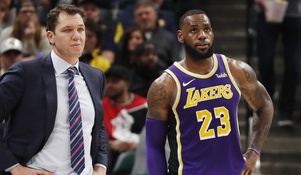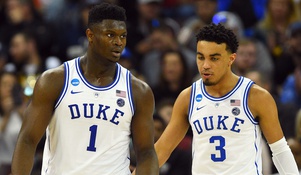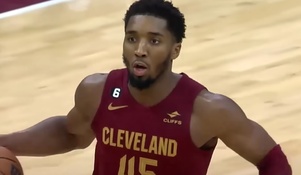A Struggling NBA Team Should Bite the Bullet and Hire a Writer as GM
The NBA is a league of haves and have-nots. This has always been true, but arguably never moreso than right now. Over the past decade, a relatively constant cast of characters has come to populate the lowest levels of the league, and most of them are immediately obvious from even a cursory look at the bottom of this year’s standings- Cleveland, New York, Orlando, Phoenix, Memphis, and so on. Several of those teams lucked their way into contention in recent seasons, but when the factors that enabled such broken-clock-style success departed (hello, LeBron James!), these GM’s faced the music that is their litany of poor decisions. All of a sudden, Jordan Clarkson’s your leading scorer, or DJ Augustin is playing over 30 minutes a night. Of course, poor performance is not necessarily an issue if your stars are just young, but it certainly is if Dillon Brooks is one of your most promising U25 players. In that case, a dearth of talent can lead to an avalanche of bad outcomes, from massive attendance dips to poor merch sales to the ultimate bad outcome- getting fired. Lather, rinse, repeat.
A few months ago, the atrocious Oakland Raiders (now their official team name) hired former NFL Network analyst Mike Mayock to be their new GM. The move was unorthodox, even for the eccentric and accidentally self-parodying Raider Grand Poobah Jon Gruden, but behind Mayock’s hiring lies a very intriguing philosophy (though, admittedly, Gruden probably just wanted to hire a friend)- why don’t teams innovate more often when hiring GM’s or front office executives? This constrained school of thought is right at home in the NFL, which still maintains a sizable analytics-phobic contingent among its key decision-makers, but in the overwhelmingly progressive innovation hub that is the National Basketball Association, it is curiously widespread. Almost every NBA GM or Basketball Operations president is either a former college or pro player or a basketball lifer of some sort, be that a scout, son of a player, or something else. That certainly makes logical sense, but it’s surprising that teams like the aforementioned Cavaliers or Grizzlies with very little history of organizational competence and success via traditional methods never thought to employ an unorthodox process. For instance, installing an NBA writer as GM or Basketball Ops president.
In recent seasons, there has been movement in this direction- in the last two years, two Sports Illustrated scribes- college basketball writer Luke Winn and the venerable Lee Jenkins- have been poached by the Toronto Raptors and Los Angeles Clippers respectively to play roles within each team’s front office, and former ESPN employees John Hollinger and Kirk Goldsberry have embedded with the Memphis Grizzlies and San Antonio Spurs within the past decade. All of these hires have been praised, but particularly the Clippers’ stealing of Jenkins, a hire most directly in the mold of what I am suggesting. As part of a strategy to both improve their image locally and nationally as well as potentially land big-time free agents over the next few seasons, the Clippers, a historically inept (and possibly cursed) franchise, are utilizing highly unusual avenues in order to hopefully achieve organizational stability and success. Granted, even the Clippers are in a better position to succeed than the Cavaliers and Magic of the world given their very committed owner and highly competent bureaucracy led by basketball legend Jerry West, but their starting spot wasn’t much better. In West’s first summer advising the Clippers, they paid Blake Griffin a supermax contract and handed injury-prone Danilo Gallinari almost $50 million.
However, struggling teams could reach for even further extremes than LA’s redheaded stepchild. Why not commit completely to a totally left-field process and hire a writer as a GM or key executive? Thanks to a variety of factors, national writers are more plugged into the trends, moods, and opinions that dominate the NBA landscape than ever before. If you were to ask one of them directly if they’d be interested in a GM position, they’d likely respond self-deprecatingly, citing a lack of real knowledge of the sport. However, that excuse becomes less and less valid every day. First, the best basketball writers- people like Zach Lowe, Howard Beck, and Jackie MacMullan- are not just good writers, they are excellent thinkers and analyzers of the game. They can look at the sport from all angles, from a 10,000-foot perch to the granular details, and cover all spaces in between the extremes. Secondly, no current GM is proficient at every aspect of running a basketball team- that’s what a staff is for. For instance, if somebody like Kevin Arnovitz was hired by the Cavaliers after they fire Koby Altman, the analytically-focused Arnovitz would be able to rely on film gurus, on-the-ground scouts, sports psychologists, and more specialists to round out his picture of the league.
So, in short, here’s my pitch to the dregs of the NBA- hiring a writer as GM is a low-stakes move. If it doesn’t work out, you fire them after a year or two, and you still have one or two top-5 picks to show for it. If it does work out, then great! You’re at the forefront of a possible new evolution, and get to sit back and laugh while other teams hire random writers with inexplicable blue checkmarks from C-list websites, much in the same way Los Angeles Rams management must be chuckling every time a less competent organization hires a young offensive coordinator with a strong jawline to be the next Sean McVay or Kyle Shanahan. I’m not suggesting that hiring writers to high-level management is some sort of market inefficiency, but it very well could be. It only takes one desperate, risk-favoring owner for us to find out.





